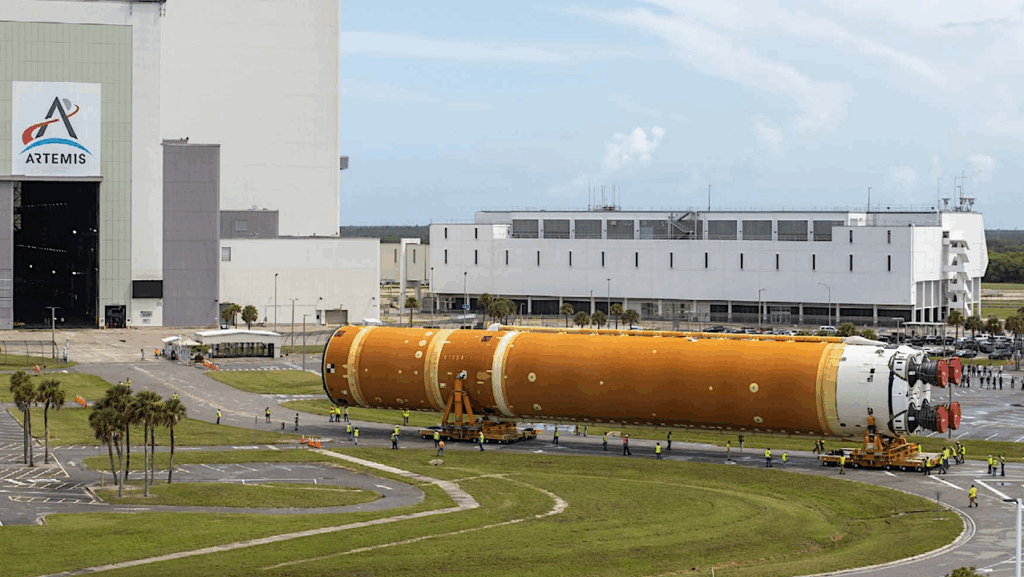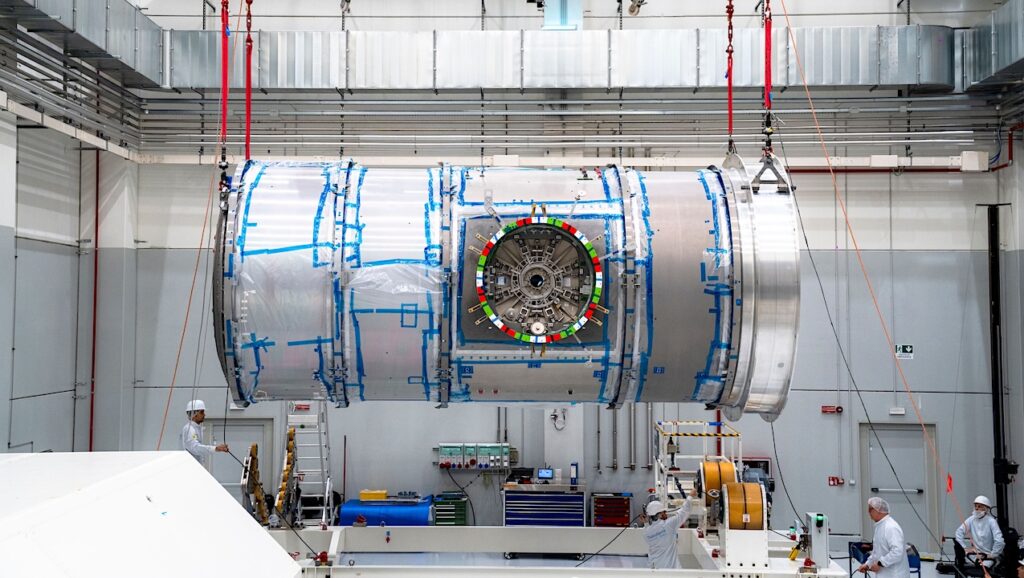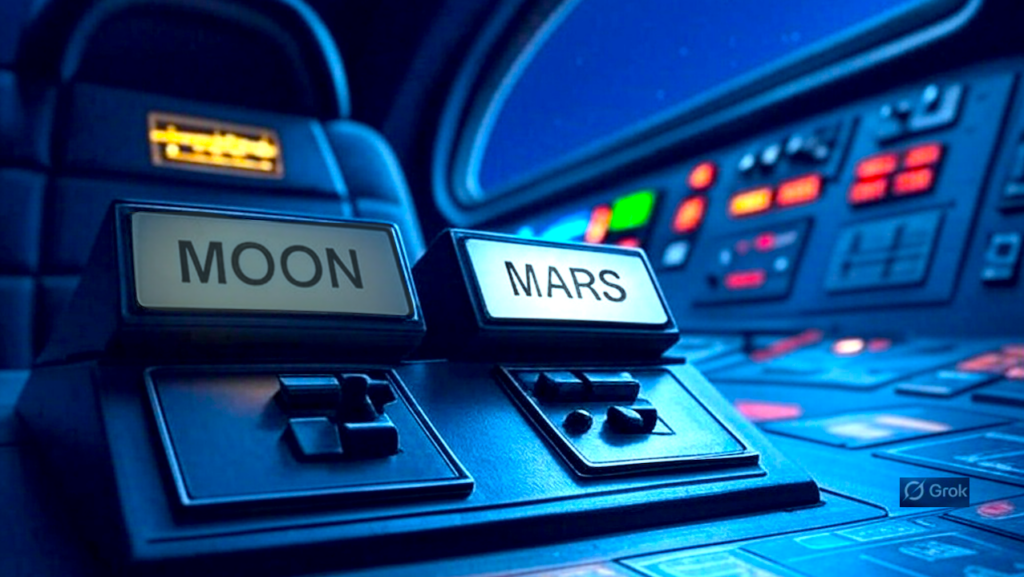If The Current Message Does Not Work Then Get A New Message
IMHO @Neal148409276 @JimBridenstine If #Artemis supporters want to reach a broader audience then they need to shout/talk/whisper smarter than is currently being done & they need to stop talking to each other & start talking to people they have never spoken to before about space. https://t.co/of5vRwfxYD
— NASA Watch (@NASAWatch) June 21, 2019









Jeff Bezos message is the one NASA should be promoting, namely that we industrialize the Moon to save the Earth while creating many gold collared jobs as a result. We know the Moon has strategic metals and Rare Earths the world needs. And lunar Industrialization makes the economics of SBSP work out. As long as folks merely see the Moon as science and exploration any effort to return will get only marginal support.
I agree and disagree. I agree focus should be economic development rather than science when getting others interested. My disagreement is Bezo model like Amazon where many of those jobs are very low pay.
“Getting the message out” appears we really don’t know what Bezo’s and Musk’s plans are except what is briefly mentioned at press conferences. For NASA, that same damn word Mars in same sentence along with going back to the moon confuses everyone.
Amazon is basically a warehouse business doing transshipping of goods. Those types of warehouse tasks have always been low skill/minimum wage jobs. Amazon’s pay rates are no different than other warehouse operations and I don’t understand why folks would them expect to be. It’s also why most of the workers are seasonal and there is a high turnover as is the case with all low skill jobs.
As for understanding Blue Origins plans, all you need to do is read Gerald O’Neill’s “High Frontier” or Harry G. Stine’s “Third Industrial Revolution”. There was also a series of books called Destinies and New Destines that outline the value of space Industrialization. All outline how development of space is critical to saving the Earth.
Does anyone know what the pay scales at Blue Origin are like? They clearly have some good engineers working there, and you don’t attract that sort of talent without paying for it.
I have heard they pay a significant premium. They also seem to be a bit more open to older workers and have less required overtime than SpaceX.
From what I gather pay rates and working conditions at SpaceX are basically similar to what they were at NASA during Project Apollo. You basically have young, skilled, creative and highly motivated workforce determined to do what everyone says is impossible. They are also not burden by bureaucracy. Those are generally the conditions need to make giant technological leaps into the future.
Folks would expect the wages to be higher because some of us believe in wage fairness, eschewing the notion that labor should be mercilessly exploited and that indeed it is meet and proper to do so.
This kind of thinking has resulted in an enormous conentration of wealth in America. And no matter disagreement on the causes of this conentration, there’s widespread agreement that it is in itself a bad thing for America and Americans.
At some point – not in my lifetime – relentless capitalism will go the way of mercantilism (currently favored by the WH, in many ways), and of the Divine Right of Kings.
There is no fairer method of allocating labor resources than a properly regulated free market. Attempts to create substitute methods, as in Europe, only result in higher unemployment and an associated dependence on government welfare that creates more poverty for everyone. Wages are low for warehouse workers because anyone of average physical strength is able to do the job with little if any training. So there is a large labor pool relative to the number of openings.
Raising wages would require increased productivity or the raising costs will result in that firm’s reduction of market share which would lead to bankruptcy. Then no one has a job.
The standard of living that is enjoyed today, the highest in the history of the world, is due to our regulated free market economy. The same is true for the advanced technology we have access to. It’s a real shame schools don’t teach either economic history or comparative economics.
As for criticism of the wide difference in wealth, it is well to remember that wealth is not stashed in money bins as in s Scrooge McDuck comic, but is used to create additional jobs, new technology, or fund social needs the government doesn’t cover. Prior to WWII, when high taxes started to erode that wealth, the majority of research in science and exploration was privately funded by the wealthy. Now that a reduction of taxes has allowed wealth to accumulate again its once more being put to that use.
Returning to the topic of this discussion, neither SpaceX or Blue Origin could have existed in the 1950’s or 1960’s because the high tax rates would have prevented enough wealth to be accumulated for such risky ventures. Instead we have seen both firm’s prove NASA was wrong when they said reusable rockets don’t work, and wrong when NASA argued that spaceflight must be expensive. Private ventures like New Glenn and Starship/Super Heavy, funded by that “excess wealth” you rant about are far more likely to return America to the Moon, and develop its resources for humanity than any government run space agency.
If you like there is a reading list I could provide you that I use in teaching my graduate course on the American Entrepreneurial Tradition that goes in far more detail why such worries about “excess wealth” have no base in fact.
It’s off topic, but… I think there is one hole in the argument for high salaries for senior management. Those wages are not set by the free market. Specifically, the free market assumes the decisions about what a product or service is worth are, in some sense, unbiased. When a board of directors approves a CEO’s contract, they are not unbiased. They know their own salaries are tied to the CEO’s (both since it affects the industry standard and since they aren’t likely to get more than the CEO.) In a sense, they are voting on their own salaries as much as on the CEO’s. That is not a free market at work.
That is one of the continued challenges of corporate governance, keeping the board of directors independent of management while still having a board that is knowledgeable of the industry. It is more of a challenge when corporations are privately owned.
Rare earth minerals. Well, I guess we could vilify the Chinese. They do control most of the world’s production of rare earths, and we are in a trade war. If people think it will be easier to get them from the Moon than from China, then they might start caring.
The moon is not a good source of REEs. Yes, KREEPs are enriched relative to chondritic abundances, but then so is the Earth’s crust.
That may not be relevant. The good places for a mine are never locations with the _average_ crustal abundance of something. They are in places where some natural process has produced a high, local concentration. The local processes on the Earth and Moon are clearly different. So the real question is whether or not the local and extremely atypical concentrations on the Moon are exceptional compared to those on Earth. I think that’s an open question. And a job for prospectors to resolve.
Yes, we know so very little about the Moon and its resources. A hundred rovers could be kept busy just answering questions about the mineral resources on the Moon, and where they are located.
Precisely. KREEP basalts are mixed in with the rest of the material but have *very* different abundances at the different Apollo sampling sites. Therefore, the KREEP samples we have were scattered from some ore body or bodies we haven’t directly sampled or even located yet. What the abundances are in that ore body are as yet unknowable.
All the nostalgic attention on the Moon landing gave NASA a short window to get people enthused. That opportunity is over in a few weeks. Another missed opportunity. despite Bridenstine’s best efforts at coordinating and cheer leading, he cannot get beyond the uncoordinated efforts of his people.
Doesn’t help that Bridenstine’s obligated to put lipstick & makeup on the Senate’s pig.
I think if you polled the American public right now, 90-95% of them would have never heard of Artemis. Probably over 50% believe NASA ended after the last shuttle flight.
I’ll confirm that a fair number think (or thought) NASA ended with the Shuttle. Living in San Antonio and occasionally talking to taxi drivers, or people I was sitting next to on an airplane, I’d occasionally mention what I do for a living. In 2012, I got a few “you mean NASA is still around?” or “does that mean you’re going to lose your job when NASA shuts down?” responses.
It’s going to be a pretty hard sell when the people actually working on it b**** and moan about it on social media.
Also the very public fact that a major part of the program is years behind schedule and billions over budget has to be taken into account.
These types of things don’t exactly inspire confidence in the public.
More suggested reading. And dont be swayed because it says Mars, as many of the ideas are relative or adaptable to all human space flight.
https://www.academia.edu/11…
I am not surprised that Yuri’s night and World Space Week are not that popular in the U.S. since they celebrate Soviet space victories in the Cold War. Moon day by contrast has potential and it really should be a national holiday. That could be one way to promote more public interest in space and NASA.
Folks have apparently been making an effort to get July 20th designated by Congress as ‘Space Exploration Day’ since the 1970s. A waste of energy as far as I’m concerned. Why would I need anyone’s permission? I just went out and started celebrating, and continue to do so a decade on.
Yuri’s Night (which also celebrates the first Shuttle launch, and Loretta Hidalgo-Whitesides’ birthday) and World Space Week celebrate human space achievements. Yuri’s Night got its start in 2001 here in the U.S., basically at JPL, though the youngsters were obviously networked globally, largely through ISU (which gee, got its start in Cambridge, MA in 1988).
But, yeah, okay, fine…tribalism.
Don’t knock it, it was tribalism that got us to the Moon. ?
If the Russians hadn’t folded it would have also gotten us to Mars decades ago.
A national holiday creates a day that everyone is focused on, or at least remembers because they get a day off, which is what raises the visibility of the event. Given the political issues with Columbus Day, Space Exploration Day would be a logical replacement as a national/state holiday.
Again, it’s about promoting space, and NASA, to the average American instead of just to the choir.
I like the idea, but I’m not convinced it would have a big impact. As far as I can tell, Labor Day and Memorial Day are just days off. How many people remember what Memorial Day is supposed to remind them of? And workers and labor are what most people are _not_ thinking about on Labor Day. In a way, not thinking about labor is the whole point of a day off from work. Based on that, I think a national holiday on July 20th would be a fine thing, but I have no illusions about it being a strong reminder about American spaceflight and exploration. (Also, could we have fireworks? It would be fun, even just two weeks after the fourth of July. Launching rockets would also be appropriate, but perhaps not rockets which explode…)
It could be used as a focus for parades, fireworks or other events, after all it is a day to celebrate a great achivement. At the very least there will statements by politicans on where they stand on space, just as they feel required to make statements on other holidays. And if nothing else it will at least remind folks of the date we landed on the Moon, and on Mars with Viking 1, as they enjoy their picnics and time at the beach.
Also being in summer will make the tourist industry happy, since folks are more free to travel than in October when Columbus Day is observed, so the tourist industry would be a natural ally in making it happen.
I like the idea as well but unfortunately it isn’t going to happen, one reason is that July 20th simply suffers the fate of being too close to Independence Day.
Yea I know we have Christmas, New Year’s and MLK closely bunched (New Years and MLK in the same month like Veteran’s Day and Thanksgiving) but let’s face it these holidays are much more visible/important to the public than Space will ever be.
Perhaps, but there is probably a better than even chance of getting this Administration to do it. First, from everything I have heard they have a real interest in space. 2) It fits well their narrative of American exceptionalism. 3) It will boost the economywith the increased tourism that is usually associated with a 3 day Summer weekend. So President Trump just might be willing to do it. Of course there is the Congress, but given the negatives associated with rejecting such a proposal they will likely go along.
Yes agreed, this Administration is very refreshingly Pro Space. Now Congress needs to get onboard and take us back to the Moon!
Talking with 20-somethings at YN at Ames Research Center none of them perceived it as celebrating Soviet space victories but notable date when humans began space travel.
I am sure those same 20-somethings would be not be so supportive if the date you were celebrating to mark when spaceflight begin was when the first rocket reached space, a NAZI A4 on Oct. 3, 1942.
The thing is the Soviet Regime was just as bad, if not worst, than the NAZI Regime, murdering directly some 20 million and indirectly tens of millions more. Just like German A4’s were built with camp labor likely some of the metals used in Yuri’s rocket came from mines using labor from the Gulags. Other Gulags likely provided the human subjects for the laboratory experiments that led to the life support systems that kept Yuri Gagarin alive.
So celebrating Yuri’s night is actually honoring the accomplishments one of the most brutal and inhuman regimes in history. It’s says, “who cares how many the Soviet Regime murdered, they took humanity into space first and that is all that matters. Let’s party!”
https://www.wsj.com/article…
100 Years of Communism—and 100 Million Dead
By David Satter
Nov. 6, 2017 6:43 pm ET
“The Bolshevik plague that began in Russia was the greatest catastrophe in human history.”
Many today see the Moon Race as merely a race between two “tribes”, but as folks at the time recognized (just review President Kennedy’s, VP/President Johnson’s and Senate speeches on it) it was a race between a free people who freely choose to go to the Moon and a dicatatorship that used its enslaved population to reach space. We seem to forget that.
As President Kennedy stated in his famous speech at Rice University.
“For the eyes of the world now look into space, to the moon and to the planets beyond, and we have vowed that we shall not see it governed by a hostile flag of conquest, but by a banner of freedom and peace.”
And on July 20, 1969 the LEM landed on the Moon, furfilling that promise with a plaque that read “We Came in Peace for All Mankind.” that basically summed up the victory of a free people over a brutal dictatorship. It’s why the Apollo Generation sacrificed the way they did and is something to remember as we approach that 50th Anniversary.
https://spacenews.com/poll-…
Great to hear from someone so involved in that side of things. I do believe there is an audience here for these kinds of celebrations, but it’s hard to get any kind of institutional support. I’ve been hosting the Yuri’s Night event in Detroit since 2010, and this is what I’m doing for the 50th here: https://uploads.disquscdn.c…
NASA is striking out in too many aspects: they have no clear plan. If they have no plan it is hard to craft a message,.Then they are doing a really poor job of communicating. Their internet presence is all over the place as is their social media. A real problem is they keep placing people with few communications skills in positions in which they are called upon to communicate. And they put people who are not systems architects in positions in which they are called upon to come-up with a plan and architecture. And they put people who have never done commercial work in charge of commercialization, and people who have never developed a spacecraft system in charge of systems development. If they could fix some of there problems with lack of experience, then maybe they could begin to craft a message, then maybe they could try to communicate it. Good luck!
I honestly do not think NASA’s message is believable anymore, certainly not in human space. Just read the latest OMB reports. SLS is years overdue and billions of dollars over budget and NASA is trying to hide it. Orion is now going on a decade overdue. NASA has not been able to launch anyone in years and yet they plan to put people on the Moon in less than 5 years. Not likely.
This BIG news from Mars may help messaging:
In a measurement taken on Wednesday, NASA’s Curiosity rover discovered startlingly high amounts of methane in the Martian air, a gas that on Earth is usually produced by living things. The data arrived back on Earth on Thursday, and by Friday, scientists working on the mission were excitedly discussing the news, which has not yet been announced by NASA.
“Given this surprising result, we’ve reorganized the weekend to run a follow-up experiment,” Ashwin R. Vasavada, the project scientist for the mission, wrote to the science team in an email.
Yes, it is time to revisit, perhaps even repeat, the Viking 1 and Viking 2 experiment results on Martian life.
Curiosity (and, from orbit, Mars Express) have seen methane before. The abundance spikes in a localized and transient way, and no one understands where it’s coming from. There are possible, non-biological sources as well as biological ones. So don’t automatically assume this is from life. The real question is what ExoMars Trace Gas Orbiter sees. Two of its instruments were specifically designed to measure methane, and also other trace gases. The non-biological processes would produce more than just methane, so these measurements could identify the nature of the source. TGO, by the way, has been there and in its science phase for a bit over a year, and hasn’t seen methane yet. It wasn’t there in 2014, when Curiosity last saw a big methane spike.
It’s good that Mars Express saw it as well. Otherwise I would think it might be an instrument problem with Curiosity.
I didn’t quite say that. If memory serves Mars Express and Curiosity saw different methane events at different times. Transient and localized events are a real pain to study. And Gale crater, by the way, has its own microclimate, and that doesn’t help in the interpretation.
To do it right, you really need to look everywhere, all the time. But that means collecting tons of boring data. If, for example, you wanted to study hurricanes hitting New Orleans, how many days of nothing-is-happening would it take before you were in the right place and at the right time? But, in general, planetary missions are focused on making big discoveries, not on monitoring.
This post by Keith must be about the 1,000th one he’s done about NASA needing to change/improve/broaden its Human Spaceflight messaging, to be more effective.
But after decades of poor public response to NASA HSF messaging, perhaps it is time to seriously consider why that’s so. Seems to me there are only two credible possibilities. 1. The US population is too stupid to understand any messages about why HSF is good for them. 2. The US population does understand the messages, but isn’t buying that HSF is good for them and needs to be continued and expanded by NASA (or any government entity). I believe it’s 2.
I believe it’s about 80% 1 and 20% 2.
I agree with 2 and the reason the public is buying that HSF, or even space exploration, is good is because the goals NASA is focus are not goals the public sees as important. Marketing has never been about just about selling something, its about first listening to what consumers want. This is the big failure in space policy at NASA.
If you want to get people interested raise the cool factor. Example: NASA does planetary exploration better than anyone else. The pictures alone provide the needed amount of “cool” and “wow” to generate support. When you do it well, you make it look easy and they do make it look easy. Rockets and human spaceflight? Not so much. 11+ years to develop the Orion space capsule? 8+ years to develop a rocket? Paying the x-cccp for rides to ISS? NASA has created lowered expectations in human spaceflight and its going to be hard to get trust back.
SpaceX does cool very well. Whatever you may think of SpaceX they have done more things lately that creates interest in space than NASA. Every time SpaceX lands a booster NASA should be directly associating with them in some way and (please) cover it. NASA should have had a meatball right next to the SpaceX logo on the 1st test flight of the crewed spacecraft (and every cargo spacecraft forward). Look at the interest generated by the 1st Falcon Heavy launch. The payload was cool! Even Hot Wheels made a toy car of it! It engaged the American people. Use the examples from the 1960’s to reached the average person. The American people love space, they want more of it. Going back to the moon with full support is a win/win.
Yet humanity doesn’t launch rockets; nations do. So there exist also among the spacefaring folk special themes that place interplanetary exploration within the peculiar frame of a national experience. In particular, there exist groups for whom extra-Earthly exploration is a means to perpetuate or recreate what they regard as the fundamental drivers of American civilization. Space exploration offers the chance to discover another New World and to erect a New America, a technological New Jerusalem, beyond the tug of the Earth’s gravitational field and the burdens of its past. Only a New Earth can save the Old. Space colonization would remake William Bradford’s vision of Plymouth Plantation into a very high-tech city and transplant it to a very distant hill.
CRITICAL ISSUES IN THE HISTORY OF SPACEFLIGHT NASA SP-4702
Is this realistic? The Pilgrims paid their own way with no government funding at all. We have to bring the cost of human spaceflight down to a level that at least some people can afford.